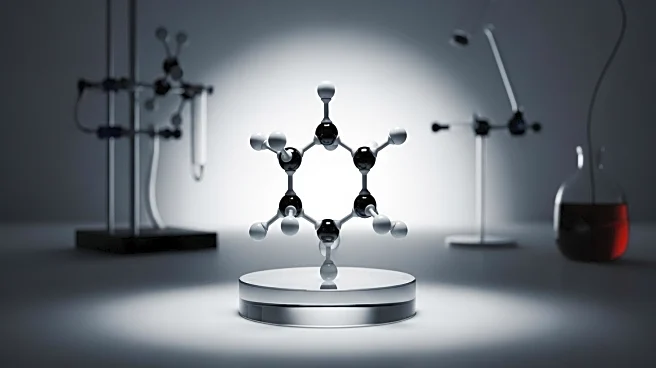What's Happening?
Three scientists, Susumu Kitagawa, Richard Robson, and Omar M. Yaghi, have been awarded the Nobel Prize in Chemistry for their development of metal-organic frameworks. These structures can trap large quantities of gas, potentially aiding in the removal of greenhouse gases from the atmosphere and harvesting moisture from deserts. The frameworks, which resemble the magical handbag from the 'Harry Potter' series, are capable of holding vast amounts of gas or liquid due to their customizable holes. This innovation could address significant global challenges such as pollution and water scarcity. The scientists' work, which began with Robson's research in the 1980s, has led to the creation of stable atomic structures that allow for precise control over the storage of specific molecules.
Why It's Important?
The development of metal-organic frameworks has significant implications for various industries and environmental efforts. By potentially removing greenhouse gases from the atmosphere, these structures could play a crucial role in combating climate change. Additionally, their ability to harvest moisture from desert air could provide clean drinking water in arid regions, addressing water scarcity issues. The frameworks are also being explored for use in targeted drug delivery, which could revolutionize medical treatments by allowing for controlled release of medications. However, challenges remain in translating these laboratory successes to real-world applications, particularly in maintaining efficiency under varying environmental conditions.
What's Next?
Researchers are continuing to explore the applications of metal-organic frameworks, with a focus on scaling up their use for industrial and environmental purposes. The potential for these structures to store toxic gases and aid in pollution control is being actively investigated. As the technology advances, it may lead to new methods for addressing global environmental challenges. The scientific community is also looking into further refining the frameworks for more efficient gas and liquid storage, which could enhance their practical applications in various fields.
Beyond the Headlines
The ethical and environmental implications of this breakthrough are profound. By providing a new tool for addressing climate change and water scarcity, the research highlights the importance of scientific innovation in solving global issues. The ability to store and control gases and liquids at a molecular level could lead to significant shifts in how industries manage resources and emissions. As these frameworks become more widely adopted, they may also influence regulatory policies and environmental standards, promoting more sustainable practices across sectors.










